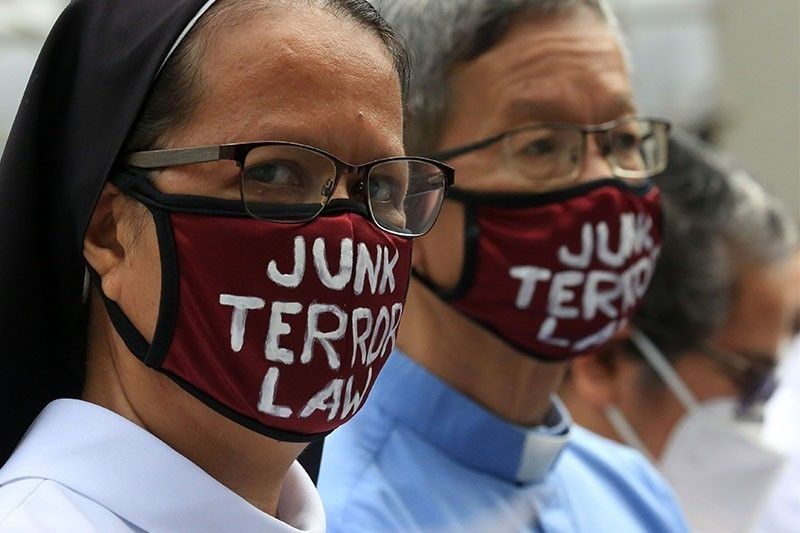Petitioners find same problematic provisions in anti-terrorism law IRR

MANILA, Philippines — The Implementing Rules and Regulations of the Anti-Terrorism Act of 2020 feature the same unconstitutional issues raised against the law itself, petitioners said Tuesday.
The DOJ on Saturday released the 48-page IRR of the highly contentious law, but while petitioners recognized the attempt to clarify some provisions of the law, they stressed that questions remain around the law that authorities have promised will not be used to silence dissent.
Integrated Bar of the Philippines president Domingo Egon Cayosa, in an interview with Super Radyo DZBB, pointed out that the DOJ itself admitted that the IRR it crafted cannot change or add to the law. "It (IRR) cannot cure any defect or change the law because the IRR must conform with the law," he said.
Justice Secretary Menardo Guevarra said last week: “If the law falls, the IRR automatically falls. No leg to stand on.”
RELATED: With anti-terror law IRR done, time running out for SC to grant immediate relief — petitioners
Here are some of the issues raised against the IRR:
On advocacy, protest, dissent, strike, mass action as possible terrorism
Following the text of Republic Act 11479, the IRR stated that advocacy; protest; dissent; stoppage of work; industrial or mass action; creative, artistic and cultural expressions; and other similar exercises of civil and political rights are not considered as acts of terrorism.
But if the prosecution arm of the government deems and proves that these activities “intended to cause death or serious physical harm to a person, to endager a person’s life or to create serious risk to public safety,” then the actor may be held liable for terrorism.
National Union of Peoples Lawyers president Edre Olalia pointed out that the determination or malicious imputation of the intent and purpose is subjective, or an internal process, instead of a "determinable/defined act (predicate crime) and effect/result of the act."
Olalia also flagged the inclusion of “creative, artistic and cultural expressions” in the IRR which he said is a “threat to freedom of expression, speech, press *(read in relation to ‘inciting to commit terrorism’) via speeches, writings, emblems, banner,etc.”
EXPLAINER: 'Mother of red-tagging': No process yet to remove names from terror list
On warrantless detention
Under Rule 9 of the IRR, the “[Anti-Terrorism Council] shall issue a written authority in favor of the law enforcement officer or military personnel upon submission of a sworn statement stating the details of the person suspected of committing acts of terrorism, and the relevant circumstances as basis for taking custody of said person.”
A law enforcer or military personnel without written authority from the ATC should deliver the suspected person to judicial authorities within the period specified under the Revised Penal Code’s Article 125, which provides that authorities must bring detained persons to judicial authority within, at most, 36 hours.
But if the law enforcer or military can secure a written authority from the ATC before the period under Article 125 lapses, then the period allowing of up to 24 hours of detention will apply.
The Public Interest Law Center, one of the petitioners against the law, also flagged this provision. “It is like giving the police a blank check where they can list any person they choose to arrest,” it said.
On 48-hour window for court notification
Still under Rule 9 of the IRR, law enforcers are directed to notify in writing the judge of the nearest trial court immediately after taking custody of the suspected person.
“Immediate notification shall mean a period not exceeding 48 hours from the time of apprehension or arrest of the suspected person,” Rule 9.3 read.
Justice Undersecretary Adrian Sugay, the ATC’s spokesperson, said that in putting the 48-hour period, they took into consideration “limitations on the ground especially where the law enforcement operations are undertaken in very remote areas.”
But IBP’s Cayosa questioned the amount of time given to security personnel, saying that authorities can immediately bring the detained person to court.
NUPL’s Olalia also said the 48-hour period is open to “abuses, torture, coercion, manufacture or destruction of evidence.”
On publication of list of designated terrorists
The PILC continued that the IRR shows that the government can unilaterally declare persons or groups as terrorists without prior notice or hearing. “Akin to the notorious and dreaded drug lists of the Duterte administration’s ‘tokhang,’ policy, designation is a blatant flex of force,” it said.
This is another provision not found in the law, but was included in the IRR. Rule 6.5 of the IRR states that ATC resolutions of designation will be published in a national newspaper, and on the websites of the Official Gazette and the ATC. On the websites, the list will include the name of the person, brief description of the case for designation and date of designation or last review of designation.
Those designated as suspected terrorists may file a verified request for delisting within the ATC within 15 days from publication. The appeal may be filed as often, but once denied, the next request would be filed after six months.
But the PILC pointed out that while it recognized that a person or group may be delisted, “no amount of post-designation remedy... will repair the damage done.”
SC pressed to act on petitions
IBP’s Cayosa said they are hoping that their petition pending before the SC will move forward especially now that the IRR is out. “All the ingredients are now there. They can hopefully proceed with it and decide on the merits,” he said.
EXPLAINER: Cheat sheet on the looming legal battle on the anti-terrorism law
The PILC also called on the SC to act on the 37 petitions filed against the anti-terrorism law. The lawyers’ group noted that members of religious groups, which they represent, are “presently and actually being charged in courts today for daring to speak and work against government’s anti-people policies.”
“Every day that passes with this law in place, is a day spent in terror and unjustness,” it added.
The SC has yet to announce a date for the oral arguments on the petitions. The next SC en banc meeting is set on November 3.
- Latest
- Trending


































